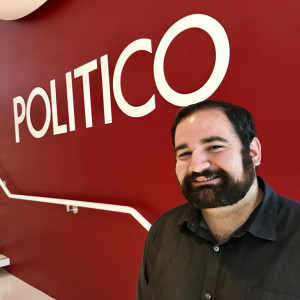Blending AI and Journalism, POLITICO’s Andrew Briz is Transforming the Newsroom
By Gigi Marino
This is the second in a series of profiles of CJC alumni who are working with artificial intelligence.

Journalism is changing rapidly as new AI tools emerge, and Andrew Briz is at the forefront of this evolution.
As the editorial director of newsroom engineering at POLITICO, Briz is exploring how various AI-centric technologies can be applied to traditional media – from open-source large language models (LLMs) to AI-assisted writing platforms like Lex, which offers advanced writing assistance that checks for clarity, readability, and confidence.
“I think we’re in this weird in-between, where we’re very digital, but we’re still, I think, figuring out what our online audience wants,” Briz said.
Briz first honed his journalistic instincts when he was a student at the University of Florida College of Journalism and Communications, working toward a 2018 bachelor’s degree in telecommunication. Back then, he had his sights set on becoming a TV producer. Little did he know a single elective course would alter his career trajectory.
“I came to UF with thoughts that I would be in TV news right away. I thought I wanted to be a TV producer, an executive producer, and one day have my own show,” Briz said.
However, after spending a summer producing a show, Briz realized that the day-to-day routine of TV production did not appeal to him as much as he had anticipated. It was a chance encounter with a pamphlet, advertising a coding class in journalism, that sparked Briz’s interest in pursuing a different direction.
“I saw a pamphlet that said, ‘Do you want to do coding and journalism?’ I already had a coding hobby,” Briz said.

This led Briz to take an elective course with journalism professor Mindy McAdams – a decision that would prove pivotal in shaping his future career.
“I took that class, and that is really what I think propelled me to where I am today,” Briz said.
The course opened his eyes to the possibilities of merging his love for coding with the context and purpose provided by journalism.
Shortly after graduating from UF, Briz landed what he describes as his “dream job” at POLITICO, where he has been ever since. In an industry where the average tenure for a media specialist is just one to two years, according to Zippia, Briz’s six-year – and counting – stint at POLITICO is noteworthy.
Briz’s current role involves leading a team of developers dedicated to creating innovative tools that enhance storytelling and news coverage.
“We focus on what we like to call perennial news coverage gaps,” Briz said, explaining that his team looks for recurring challenges in news reporting and develops technological solutions to address them.
One recent project Briz is particularly proud of involves a system that uses AI to provide real-time summaries of live events, such as political debates or speeches. This tool allows POLITICO’s journalists to focus on investigation and analysis – rather than simply reporting what was said – which enhances the depth and quality of their coverage.

Briz’s work hasn’t gone unnoticed. Last year, he was selected for the Axel Springer inaugural Generative AI fellowship cohort. This program, spearheaded by POLITICO’s Berlin-based parent company, allowed him to pause his day job and dedicate three months to living in San Francisco, Calif. There, he researched, documented, and developed AI use cases and partnerships in journalism.
Briz has continued to work on several forward-thinking projects, including the Argus app, which allows reporters to “subscribe” to notifications from specific legal cases they are tracking when there are updates and filings; a headline suggester tool that integrates into POLITICO’s headline testing tool and creates headline suggestions to A/B test; Artisan, an app that connects to Adobe Illustrator, allowing graphic reporters and artists who do not code to easily publish responsive embeds to enhance stories; and an embed system, which loads election results into stories and keeps them up to date when new data emerges.

Despite his expertise in these technological areas, Briz remains humble about the rapid pace of change in the field of journalism.
“I’ve been in awe and humbled by how late I feel to this party and how little I know about using LLMs and AI models beyond calling an API (application programming interface),” Briz admitted, highlighting the ongoing learning process in the industry.
Reflecting on his career journey, Briz emphasized the importance of embracing diverse experiences during one’s college years. He encourages students to explore different aspects of journalism and communication, even if those areas seem tangential to their main interests.
“I always tell students to just really embrace the fact that college gives you lots of ways to just try to develop,” he said.
As for the future of journalism and technology, Briz remains optimistic and excited about the possibilities. Using his distinctive blend of technical skills and journalistic instincts, he is well-positioned to help shape that future, one line of code at a time.
Category: AI at CJC News, Alumni Profiles, College News
Tagged: AIatUF Andrew Briz Mindy McAdams Newsroom Technology POLITICO
Subscribe to our News Digest


